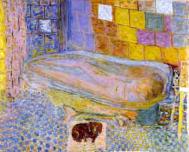PERHAPS IT IS because my father is a plumber that I have a particular appreciation for that special room fitted out with tubs and toilets, sinks and mirrors. I enjoy a plumbing supply showroom as much as some people like opera. For me, the bathroom is the spiritual core of a house and deserves special attention as we try to live a soulful ecological life.
You have to push your imagination past the literal and practical to see the mystical side of a bathroom. Old alchemical pictures show an old man, a king and queen, or a child sitting or lying in a bath, going through a profound change in the soul. Their bath is a ‘solution’ in which the problems of life are soaked and sorted out. I look at those old woodcuts and learn from them how to take a bath for my soul as well as my body.
The Greeks highlighted the theological dimensions of a bathroom in several stories of goddesses taking a bath. Artemis, the spirit of the pristine forest, takes a bath surrounded by a shield of wood nymphs. Hera goes to a spring to renew her virginity in a bath. But the most prominent goddess of the bathroom is Aphrodite. Sacred statues show her disrobing, removing her jewellery, drying off, and either sinking down in or rising up out of the water. They even had a name for the ritual of getting up out of water, something most of us do routinely after a bath: anadyomene, as much a sacred gesture as one of the Buddha’s mudras.
Aphrodite is the spirit of beauty, body, sensuality and sexuality, love, pleasure, and adornment. It is her spirit, and not necessarily some egotistical urge, that moves us to spend time rubbing oils into the skin, brushing our hair, fussing over shampoos and soaps, and spending long periods in the tub or shower. These acts are genuine rituals in the spirituality of Aphrodite/Venus. They are holy actions, of extreme importance to the soul, making life pleasurable. When you take a bath, you soak your soul as well as your body.
IT’S IMPORTANT TO spend time enjoying taking care of your body, not just for health but also for comfort and pampering. We live in a world that has adopted anti-Venusian values to live by and fails to see the virtue in simple bodily pleasures. Some identify spirituality with disregard for the simple pleasure of Venus. Maybe that is because Venus is a goddess or spirit of the deep soul rather than the sublime spirit. I might go so far as to say that good bathing might tame our tendencies toward violence. There is an ancient tradition that Venus calms the excited and warlike urges of Mars.
Just as a church might have a holy tabernacle and a Jewish temple sacred scrolls, so Aphrodite has her own spiritual implements: soaps, cosmetics, oils, fragrances, sponges, and towels. The tub is like a baptismal font, a good moisturiser, a kind of blessed oil. In Aphrodite’s realm a luxurious towel may be as precious as a holy book.
Art also shows Venus holding a mirror. A mirror can be handy for passing narcissism, but it is also an instrument of Venus. Gazing at your face, your hair and your body, you are practising a Venusian form of yoga. In her ‘church’, taking time to care for your skin and your hair, not being frugal but rather extravagant, is a virtuous thing to do. To bring the Venusian spirit into your life, a way to increase the soul in your environment, you might look for a particularly beautiful and suitably ornate or stylistic mirror for your bathroom. Maybe more than one.
The simple act of disrobing is a Venusian gesture. It is probably difficult for most modern people to appreciate this shift in focus from shame to appreciation and from purity to sensuality. But to remain only in the religion of reserve and bodilessness is to deprive spirituality of its physicality, leaving it abstract and severe. Take away any degree of moralistic concern that has been forced on you, and see how the simple act of disrobing stirs your feelings.
I truly believe that the cultural decision in the West, centuries ago, to dissociate from all Venusian values in favour of an unnecessarily spartan spirituality was a devastating development for the spiritual lives of millions. It falsely separated body from spirit, thereby allowing no place for the soul.
I have said nothing about shaving or the toilet. These are too rich to include in a mere survey of the bathroom and each requires an essay of its own. But taken together they represent an important aspect of a soulful ecology. For a bathroom is a chamber of dreams. It could teach you, among other things, that spirituality is complete only when the body is fully present and engaged.
You could probably write an autobiography based on baths and showers you have had throughout your life. I remember one in a high school gymnasium locker room when I was about ten. It frightened me. I also remember a dark, thick ring of dirt around the tub after a bath when I was a boy. Once I took a luxurious shower in my cousin’s basement after a fourteen-hour train ride. I remember a shower before a scary heart procedure. I remember a wood-panelled, gold-plated bathtub at Windsor Park. I have a photograph of my daughter as a child in a large tub: you see just two feet sticking up from the porcelain.
For all these reasons it might be good to give some attention to the bathroom, to treat it like a sanctuary – which it is – and to appreciate how much the soul needs the water and the fragrance and the mirror and the time to be indulgent. A good bathroom is a humanising thing, a gift of the gods and a spiritual necessity.








